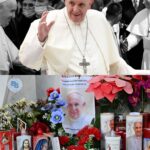
Vatican City – Pope Francis, the 266th leader of the Roman Catholic Church and the first pope from the Americas, has passed away at the age of 88. The Holy See confirmed his death early this morning, marking the end of a transformative papacy defined by humility, progressive reforms, and an unwavering commitment to the poor and marginalized.
Born Jorge Mario Bergoglio in Buenos Aires, Argentina, Pope Francis was elected to the papacy on March 13, 2013, following the resignation of Pope Benedict XVI. He quickly distinguished himself with a radically different tone — choosing simplicity over opulence, and pastoral care over doctrinal rigidity.
Throughout his 12-year tenure, Francis championed a more inclusive Church, often emphasizing mercy over judgment. He opened doors to discussions on controversial issues such as climate change, LGBTQ+ inclusion, divorce, and poverty. His landmark encyclicals, including Laudato Si’ on the environment and Fratelli Tutti on human fraternity, positioned the Church as a leading moral voice on global issues.

While admired for his compassion, Francis also faced challenges, including resistance from traditionalists within the Church and the ongoing global clergy abuse crisis, which he addressed with both apologies and institutional reforms. Despite criticism, many credit him for increasing transparency and accountability in the Vatican.
World leaders, religious figures, and millions of Catholics worldwide are mourning his passing. Cardinal Pietro Parolin, the Vatican’s Secretary of State, described him as “a shepherd who walked with his people and a man of courage who never feared change when it was necessary.”
Plans for Pope Francis’s funeral and succession will be announced in the coming days. As the Church enters a period of mourning and transition, many reflect on his enduring message: “The Church is not a museum for saints, but a hospital for sinners.”
Pope Francis leaves behind a legacy of profound empathy and a vision for a more merciful, inclusive, and engaged Catholic Church — a legacy that will undoubtedly influence generations to come.
News
Breaking news: Elon Musk surprised the entire tech world with the latest announcement of Tesla Pi Phone “Apple is not my competitor now” causing Tim Cook to immediately RESPOND.
In a stunning turn of events, Elon Musk has once again captured the tech world’s attention with the announcement of…
Ikwinento ni Barbie Forteza sa Rappler ang ugali ni Nora Aunor sa likod ng camera base sa kanyang karanasan 🥹❤️🙏 Video in comments
Ikwinento ni Barbie Forteza sa Rappler ang Ugali ni Nora Aunor sa Likod ng Camera Base sa Kanyang Karanasan 🥹❤️🙏…
Jake Cuenca posts crying photo after breakup with Kylie Verzosa – FULL STORY!
Hindi napigilan ni Jake Cuenca, 34, ang maiyak matapos isapubliko na totoong break na sila ni Kylie Verzosa, 30. Tatlong taon silang…
‘Alyana’ Yassi Pressman resists being ‘third wheel’ to Coco Martin, Julia Montes!
MANILA, Philippines — Netizens took to social media their reaction to Tuesday night’s episode of “Ang Probinsyano,” wherein Coco Martin’s…
Kylie Verzosa in Emotional Outburst After Being ‘Misquoted’ About Coco Martin’s Relationship—Did She Reveal More Than She Intended?
MANILA, Philippines — “I was misquoted!” Miss International 2016 Kylie Verzosa exclaimed when asked if she really confirmed that Coco…
OMG! Kim Chiu Left Speechless as Paulo Avellino Surprises Her with Romantic Bed Setup, Flower Petals, and a Cake—Fans Can’t Believe It!
OMG! Kim Chiu Left Speechless as Paulo Avellino Surprises Her with Romantic Bed Setup, Flower Petals, and a Cake—Fans Can’t…
End of content
No more pages to load












